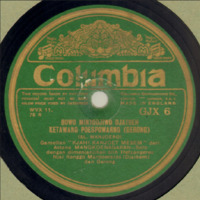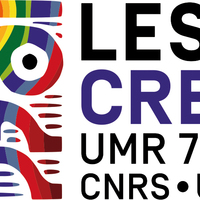Deprecated: strpos(): Passing null to parameter #1 ($haystack) of type string is deprecated in /var/www/html/themes/BBCFoundation/view/omeka/site/item/show.phtml on line 31
Deprecated: strpos(): Passing null to parameter #1 ($haystack) of type string is deprecated in /var/www/html/themes/BBCFoundation/view/omeka/site/item/show.phtml on line 45
Kecak chorus
Appearing in its present form at the beginning of the 1930s, this genre drew from older models, such as the trance-dances as practised in temples.
A chorus of men, some forty performers, seated in concentric circles facing towards the centre, where a scene from the Ramayana is played, with the texts declaimed by actors. The chorus itself performs a polyphony of diverse cries and onomatopoeias, wherein the syllables [ke] and [cak] (pronounced "cha") are stylised monkey calls. The result is a varied rhythmic counterpoint, mainly using techniques of hocket, ostinato and off-beat. Synchronisation betwecn the different parts is rigorously directed by one of the members in the chorus, a sort-of conductor whose signals can be clearly heard. There is no place for improvisation, and all the parts, whose number vary during a performance, have been learned by heart.
- Edited Title
- Archivist's Original Title
- Original description
- Time duration
- Recording date of the original material
- Acquisition Date
- Population
- Place of the cultural origin
- Country Name
- Recording place
- Resource Language
- Comment
- Archivist Category
- Recording context
- Instrument, Original Archivist Data
- Collector
- Name of original Collection
- Collection source citation
- Related material
- History of ownership
- Holding Institution of Original Materials
- Licensing Institution
- Accessing Institutions
- Copyright Information
- Copyright Notice
- Physical format
- Preservation State of Physical Object
- Original item number
- SEAH Identifier
-
en
Kecak, Bali
-
en
Kecak chorus
-
en
Appearing in its present form at the beginning of the 1930s, this genre drew from older models, such as the trance-dances as practised in temples.
A chorus of men, some forty performers, seated in concentric circles facing towards the centre, where a scene from the Ramayana is played, with the texts declaimed by actors. The chorus itself performs a polyphony of diverse cries and onomatopoeias, wherein the syllables [ke] and [cak] (pronounced "cha") are stylised monkey calls. The result is a varied rhythmic counterpoint, mainly using techniques of hocket, ostinato and off-beat. Synchronisation betwecn the different parts is rigorously directed by one of the members in the chorus, a sort-of conductor whose signals can be clearly heard. There is no place for improvisation, and all the parts, whose number vary during a performance, have been learned by heart.
-
en
0:03:14
-
en
1978
-
en
1983
-
en
Bali
-
en
Bali, Ubud
-
en
Bali
-
en
Voice CD I - Techniques: Calls, cries and clamors.
-
en
Music (Vocal)
-
en
Published record
-
en
Male chorus
-
en
Voices of the World, an Anthology of Vocal Expression (CD)
-
en
Recording achived in 1983 at Musée de l'Homme (BM.1983_021) but not yet digitized in 2024.
-
In Copyright
-
For any use, please contact the CREM-LESC (CNRS, Nanterre University, France): crem.lesc[at]cnrs.fr ; See information at https://archives.crem-cnrs.fr
-
en
Magnetic tape
-
en
Copy
-
en
CNRSMH_E_1996_013_001_001_010
-
en
SEAH_CNRSMH_E_1996_013_001_001_010




